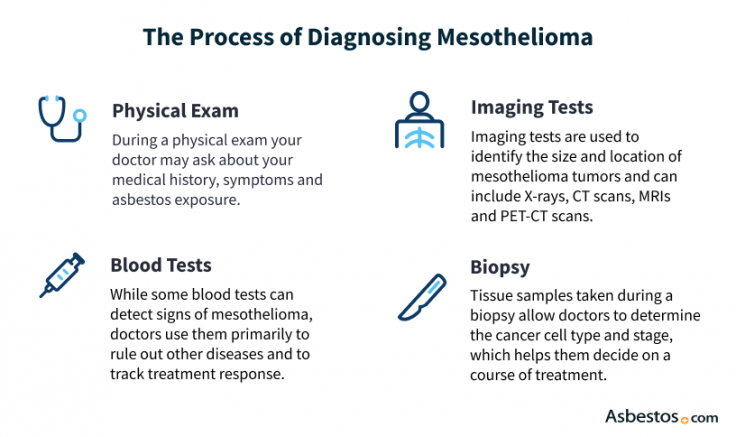
Mesothelioma Diagnosis
A biopsy is the only way to find out if someone has mesothelioma. During this procedure doctors remove a sample of tissue for testing. They choose the right biopsy method based on which part of the body is affected.
Written byKaren Selby, RN•Edited ByWalter Pacheco•Medically Reviewed ByDr. Jacques Fontaine
Asbestos.com is the nation’smost trustedmesothelioma resource
The Mesothelioma Center at Asbestos.com has provided patients and their loved ones the most updated and reliable information on mesothelioma and asbestos exposure since 2006.
Our team of Patient Advocates includes a medical doctor, a registered nurse, health services administrators, veterans, VA-accredited Claims Agents, an oncology patient navigator and hospice care expert. Their combined expertise means we help any mesothelioma patient or loved one through every step of their cancer journey.
More than 30 contributors, including mesothelioma doctors, survivors, health care professionals and other experts, have peer-reviewed our website and written unique research-driven articles to ensure you get the highest-quality medical and health information.
About The Mesothelioma Center at Asbestos.com
- Assisting mesothelioma patients and their loved ones since 2006.
- Helps more than 50% of mesothelioma patients diagnosed annually in the U.S.
- A+ rating from the Better Business Bureau.
- 五星级reviewed mesothelioma and support organization.
Testimonials
My family has only the highest compliment for the assistance and support that we received from The Mesothelioma Center. This is a staff of compassionate and knowledgeable individuals who respect what your family is experiencing and who go the extra mile to make an unfortunate diagnosis less stressful. Information and assistance were provided by The Mesothelioma Center at no cost to our family.LashawnMesothelioma patient’s daughter
How to Cite Asbestos.com’s Article
APA
Selby, K. (2023, September 25).Mesothelioma Diagnosis.Asbestos.com. Retrieved October 11, 2023, from //www.magnakarsa.com/mesothelioma/diagnosis/
MLA
Selby, Karen. "Mesothelioma Diagnosis."Asbestos.com, 25 Sep 2023, //www.magnakarsa.com/mesothelioma/diagnosis/.
Chicago
Selby, Karen. "Mesothelioma Diagnosis." Asbestos.com. Last modified September 25, 2023. //www.magnakarsa.com/mesothelioma/diagnosis/.
How Is Mesothelioma Diagnosed?
Biopsies are the only tests that can confirm a mesothelioma diagnosis. Doctors extract tissue samples during abiopsy, examining them under a microscope to detect cancer cells. The highly accuratethoracoscopy biopsyboasts a 98% diagnostic rate for mesothelioma. Additional tests aid in staging tumors and monitoring treatment response.
- Biopsies
- Blood tests
- Imaging tests
- Physical exam
The Patient Advocates at The Mesothelioma Center say many patients they speak with have told them they were diagnosed after going to the hospital for what they thought was an unrelated symptom.
Mesothelioma survivor Wendy M. Phillips told The Mesothelioma Center that she went to the hospital with a swollen arm and was initially told she had a blood clot. Further testing revealed mesothelioma tumors were blocking her lymph nodes.
All in all, this was a three-month journey to a correct diagnosis.Wendy Phillips
Testing for Mesothelioma
The different types of tests used to diagnose mesothelioma include biopsies, imaging scans, blood tests and physical exams. The results of other medical tests, such as routine blood work or chest X-rays, may indicate the need for cancer testing that eventually leads to a mesothelioma biopsy. The diagnostic process isn’t linear for everyone, and the order of tests varies significantly.

The first step in diagnosing mesothelioma is typically a physical exam. Based on your asbestos exposure history, your doctor will look forsymptoms of mesothelioma. Doctors use imaging scans to identify the location and size of tumors.Mesothelioma blood testsare not accurate enough to diagnose the disease.
“Most people who reach out to the Patient Advocate team about diagnosing mesothelioma are looking for a second opinion,” said Patient Advocate Dr. Snehal Smart. “We can help connect them withmesothelioma specialistsand arrange appointments and treatment if they do receive a confirmed mesothelioma diagnosis.”

What Happens During a Mesothelioma Biopsy?
A biopsy is the only definitive way to find out if a patient has mesothelioma. During this procedure, small samples of fluid or tissue are taken from the patient and looked at under a microscope to check for cancer cells. These samples help doctors diagnose the type and stage of the cancer so they can plan the best treatment.
- Fine Needle Aspiration or Cytology:For tissue samples that are hard to obtain
- Laparoscopy:Best for peritoneal mesothelioma
- Mediastinoscopy:For biopsies of the lymph nodes and around the windpipe for pleural cases
- Thoracoscopy:Most accurate for pleural mesothelioma
The process differs for each type of mesothelioma biopsy, including the lengths of hospital stays, but doctors always provide anesthesia to reduce pain. You may need to monitor the incision site for signs of infection after the procedure.
Pathologists look at biopsy samples under a microscope to see what types of cancerous cells are present. They useimmunohistochemical testingand other pathology techniques to identify mesothelioma cells.
How Doctors Determine Stages of Mesothelioma Cancer
Doctors use the same diagnostic procedures, such as biopsies andimaging tests, to stage mesothelioma cancer.
- Biopsies and Imaging Tests:Reveal location and size of mesothelioma tumors
- Imaging Scans:Show location and size of tumors in tissues, lymph nodes and other organs
- Tissue and Lymph Node Biopsies:Confirm location and spread of tumors
Blood tests do not play a role in staging mesothelioma.
Imaging scans often occur before biopsy procedures to help determine where to collect tissue samples. Some patients may receive a biopsy before imaging. Results of these tests commonly take several days to weeks depending upon how busy the center is. Most patients learn about their stage when they are told they have a mesothelioma diagnosis.
If we could diagnose patients a year earlier, we could start treatment earlier. Then we’d put them in protective mode where we monitor, rather than manage, advanced tumor growth.Dr. Jeffrey VelottaThoracic surgeon at Kaiser Permanente Oakland Medical Center
Imaging scans help to visualize tumors and track their response to treatment. The gold standard for mesothelioma imaging is a combination PET-CT scan with contrast dye. MRIs can also show whether metastasis or spreading has occurred.
“I did get used to the routine of going in for scans, but I still experienced ‘scanxiety,’” said peritoneal mesothelioma survivor Tamron Little, who used positive thinking to overcome anxiety. “Think positive thoughts. I know this may seem cliché, but it works. Thinking positively will take your mind off the scan.”
Why Is Mesothelioma Difficult to Diagnose?
Diagnosing mesothelioma is difficult because symptoms often mimic more common illnesses. The initial symptoms of mesothelioma also can resemble lung cancer and other chest issues. This is important for people with a history of asbestos exposure to know because they should discuss the possibility of a mesothelioma diagnosis with their doctor at the first sign of symptoms.
The decades-longlatency periodbetween asbestos exposure and development of mesothelioma means 20 to 60 years may pass before symptoms arise. Patients may not mention asbestos to their doctor because they do not remember the exposure. As a result, their doctor might not consider mesothelioma as a possible diagnosis.
Getting a second opinion from a mesothelioma specialist is important because many primary care physicians and oncologists have never encountered mesothelioma. Sometimes theymisdiagnose mesotheliomaas a less severe disease or another cancer.

What to Do After a Mesothelioma Diagnosis
Deciding on treatment is the most important first step after a mesothelioma diagnosis. Treatment for mesothelioma may include surgery, chemotherapy, radiation therapy or immunotherapy.
The treatments your doctor recommends depend on where the tumors formed, their cell type and stage of progression.Doctors specializing in mesotheliomaprovide access to innovative therapies andclinical trials.
Receiving a mesothelioma diagnosis can feel overwhelming to patients and their families. One of the bestcoping strategiesis to build a mesothelioma support network. Reach out to family, friends, neighbors and community members. A strong support system will help you get through the challenges of a mesothelioma diagnosis.
Ask your cancer center if there is a social worker who can help you access localfamily resources. It may also have a therapist available for counseling. Inquire about cancer support groups as well. Talking with others who understand your challenges is a healthy way to process stress.
Common Questions About Diagnosing Mesothelioma
- What should you do if you think you have mesothelioma?
-
If you have a history of asbestos exposure and develop mesothelioma symptoms, make an appointment with your primary care physician. If they believe you need further testing, they will refer you to a specialist.
- How long does it take to get a mesothelioma diagnosis?
-
The average time from initial symptoms, such as shortness of breath or chest pain, to a mesothelioma diagnosis is approximately three months.
- How do you prepare for a mesothelioma biopsy?
-
Stop taking any blood-thinning medication at least five days before a biopsy. Wear loose clothing to the appointment, and plan to have a designated driver take you home. Do not eat or drink anything six hours before your appointment. Plan to spend several hours undergoing the biopsy. Some biopsies, such as thoracoscopy, require at least a one-night stay in the hospital.
- Why is it important to get a second opinion?
-
Seeking a second opinion from a mesothelioma specialist is important because they have expertise in diagnosing and treating the disease. A specialist may offer a more accurate diagnosis and recommend better treatment options than a general oncologist.












